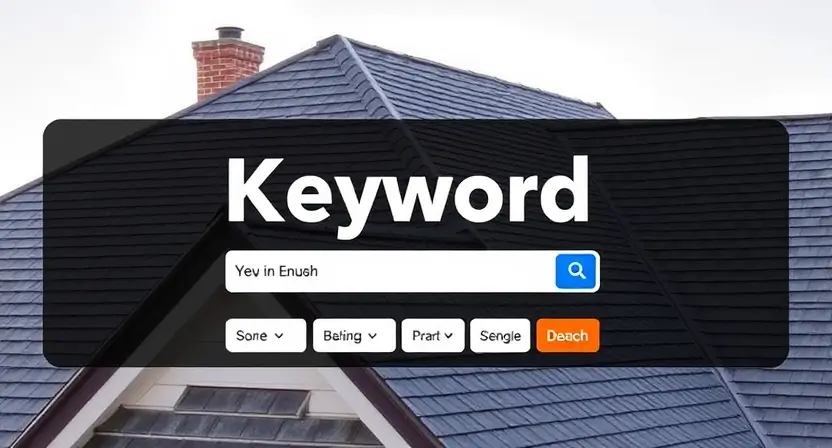Every roofing contractor wants to be the first choice when homeowners and businesses look for roofing services. How do you make sure your business stands out online? The answer is SEO (Search Engine Optimization). With the right SEO strategies, your roofing business can appear at the top of search results, attracting more clients and generating more leads.

This checklist will guide you through the essential SEO steps every roofing contractor should take. Let’s dive into what you need to do to get your business noticed online!
Why SEO Matters for Roofing Contractors
SEO isn’t just for big companies; it’s essential for local roofing businesses, too. When people search for a “roofing contractor near me” or “roof repair services in [city],” SEO helps ensure your business appears at the top of search results. With a strong SEO strategy, you can connect with more local clients who need your services.
The Ultimate SEO Checklist for Roofing Contractors
This checklist covers all the main areas of SEO: on-page SEO, local SEO, content marketing, backlinks, and technical SEO. Follow these steps to start building a strong online presence for your roofing business.
1. On-Page SEO: Building a Strong Foundation
On-page SEO focuses on optimizing individual pages of your website so search engines understand what each page is about. Here are the key steps:
1.1 Keyword Research
- Why It Matters: Keywords are the phrases people type into search engines when looking for services. By identifying the right keywords, you can target people actively searching for roofing services.
- What to Do: Start with basic keywords like “roof repair,” “roof replacement,” and “roof inspection.” Then, add location-based keywords, like “roof repair in [city].” Consider long-tail keywords, which are longer phrases that match how people naturally search, like “affordable roof repair near me.”
1.2 Title Tags and Meta Descriptions
- Why It Matters: Title tags and meta descriptions help search engines understand what each page is about, and they’re the first things people see in search results.
- What to Do: Make sure each page has a unique title tag with your main keyword, like “Roof Repair Services in [City] | [Business Name].” For meta descriptions, create a short, compelling summary that includes your keywords. Example: “Looking for reliable roof repair in [City]? [Business Name] provides high-quality services at affordable prices.”
1.3 Headers and Subheaders
- Why It Matters: Headers (H1, H2, etc.) organize your content, making it easier for both users and search engines to read.
- What to Do: Use an H1 header for your main title and H2s for subheadings. Include keywords naturally in some of your headers, like “Our Roof Replacement Services in [City].”
1.4 Image Optimization
- Why It Matters: Search engines can’t “see” images, so you need to tell them what your images are about.
- What to Do: Use descriptive filenames and add “alt text” to each image, describing it in a way that includes your keywords, such as “roof-repair-[city]-[business-name].jpg.”
1.5 Internal Linking
- Why It Matters: Internal links help users find other pages on your site and guide search engines through your content.
- What to Do: Link related pages together, like connecting your “Roof Repair” page to your “Roof Replacement” page. Use descriptive anchor text (the clickable part of the link) that includes keywords, like “Learn more about our roof replacement services.”
2. Local SEO: Get Found in Your Community
As a roofing contractor, most of your clients are likely to be local. Local SEO helps your business appear in searches from people in your area who need roofing services.

2.1 Google My Business (GMB) Profile
- Why It Matters: Google My Business (GMB) is essential for local search results. It helps people find your business on Google Maps and in local searches.
- What to Do: Claim your GMB listing if you haven’t already. Complete your profile with your address, phone number, business hours, and photos of your work. Use relevant keywords in your description, like “trusted roofing contractor in [City].”
2.2 Local Citations
- Why It Matters: Citations are mentions of your business name, address, and phone number (NAP) on other websites. Consistent citations help improve your local search rankings.
- What to Do: List your business on directories like Yelp, Angie’s List, and the Better Business Bureau. Make sure your NAP information is consistent across all listings.
2.3 Online Reviews
- Why It Matters: Positive reviews build trust and help you rank higher in local searches.
- What to Do: Ask satisfied customers to leave reviews on your GMB profile and other review sites. Respond to reviews, especially negative ones, to show you care about customer feedback.
2.4 Localized Content
- Why It Matters: Content that speaks to local needs shows potential clients that you understand their specific concerns.
- What to Do: Write blog posts about topics relevant to your area, like “Roof Maintenance Tips for Homes in [City]” or “How [Region’s Weather] Impacts Your Roof.” Highlighting local issues helps attract more clients from your community.
3. Content Marketing: Educate and Engage Your Audience
Content marketing helps you connect with potential clients by answering their questions and providing useful information. Good content improves your SEO and builds trust.
3.1 Blogging
- Why It Matters: Blog posts allow you to target specific keywords and answer questions potential clients might have.
- What to Do: Publish articles on topics like “How to Tell If You Need Roof Repair” or “Benefits of Roof Replacement.” Use keywords naturally and write in a way that’s helpful and easy to understand.
3.2 Service Pages
- Why It Matters: Having dedicated pages for each service helps search engines understand what you offer and allows clients to find the exact service they need.
- What to Do: Create individual pages for services like “Roof Repair,” “Roof Replacement,” and “Roof Inspections.” Include detailed descriptions and relevant keywords on each page.
3.3 Case Studies and Success Stories
- Why It Matters: Case studies show potential clients the quality of your work and build trust.
- What to Do: Share real examples of your projects, including photos and details about the problems you solved. This is also a great place to use keywords related to your services.
3.4 FAQs Section
- Why It Matters: Frequently asked questions (FAQs) improve SEO by addressing common queries directly on your site.
- What to Do: Answer questions like “How often should I inspect my roof?” or “What are the signs of a damaged roof?” This section helps you rank for long-tail keywords and provides value to clients.
4. Backlink Building: Boost Your Authority
Backlinks, or links from other websites to yours, show search engines that your site is credible and authoritative.
4.1 Partnering with Local Businesses
- Why It Matters: Backlinks from reputable local sites boost your credibility.
- What to Do: Partner with complementary businesses (like real estate agents or home builders) to link to each other’s sites. For example, write a guest blog post or create a “local resources” page.
4.2 Directory Listings
- Why It Matters: Quality directories help build authority for your business.
- What to Do: List your business on industry directories, like HomeAdvisor and Angie’s List, and local business directories in your area.
4.3 Guest Posting
- Why It Matters: Writing for other websites helps build backlinks and reach a broader audience.
- What to Do: Reach out to local blogs or home improvement sites and offer to write a helpful article. In return, they’ll include a link back to your site.
4.4 Community Involvement
- Why It Matters: Sponsoring events or donating to local causes builds goodwill and can earn you mentions on community websites.
- What to Do: Consider sponsoring a community event or donating to a local charity. In return, ask for a link to your website from the event’s webpage.
5. Technical SEO: Ensure Your Site Works Perfectly

Technical SEO focuses on making your site easy for search engines to crawl and understand. It’s the “behind-the-scenes” work that ensures everything functions properly.
5.1 Site Speed Optimization
- Why It Matters: A fast website provides a better user experience and ranks higher in search results.
- What to Do: Compress images, reduce redirects, and enable browser caching. You can use tools like Google PageSpeed Insights to check your site speed.
5.2 Mobile-Friendliness
- Why It Matters: Most people search for services on mobile devices, so a mobile-friendly site is essential.
- What to Do: Test your site on mobile devices to ensure it’s easy to navigate and looks professional.
5.3 HTTPS Security
- Why It Matters: HTTPS makes your site secure, building trust with users and improving rankings.
- What to Do: Make sure your site uses HTTPS instead of HTTP. This is especially important if you collect information from clients, like contact details.
5.4 Structured Data Markup
- Why It Matters: Structured data (schema) helps search engines understand specific elements on your site, like your business location and services.
- What to Do: Use schema markup for “LocalBusiness” to help Google recognize you as a local service provider.
6. Tracking and Analytics: Measure Your Success
To know if your SEO efforts are paying off, you need to track your progress.
6.1 Google Analytics
- Why It Matters: Google Analytics tracks your website traffic, showing you how people find and interact with your site.
- What to Do: Set up Google Analytics to monitor traffic, bounce rates, and conversions. This helps you see which pages are performing well and where you can improve.
6.2 Google Search Console
- Why It Matters: Google Search Console provides insights into your search performance, showing you which keywords drive traffic to your site.
- What to Do: Use it to monitor keyword rankings, search impressions, and fix any issues Google identifies on your site.
6.3 Regular SEO Audits
- Why It Matters: An SEO audit helps you spot and fix problems with your website.
- What to Do: Run regular audits using SEO tools to check for issues like slow pages, broken links, and missing meta tags.
Let Us Help You Optimize Your SEO Strategy
SEO can be overwhelming, especially with all the different components to manage. Our team specializes in helping roofing contractors improve their online presence and attract more clients through customized SEO strategies.
If you’re ready to take your roofing business to the next level, contact us for a free consultation! We’ll review your current SEO practices, suggest improvements, and help you create a strategy that works. Let’s get your roofing business noticed online!
Conclusion
SEO is a powerful tool for roofing contractors, allowing them to reach more clients and stay competitive. By following this checklist, you’ll be well on your way to optimizing your website and improving your rankings in local searches. Don’t let your competitors take the lead—start implementing these SEO strategies today to build a stronger online presence.



Pingback: Common Mistakes to Avoid When Hiring a General Contractor
Pingback: Top 30 Construction SEO Trends You Need to Know in 2025
Pingback: Why SEO is Essential for Roofing Contractors in 2024